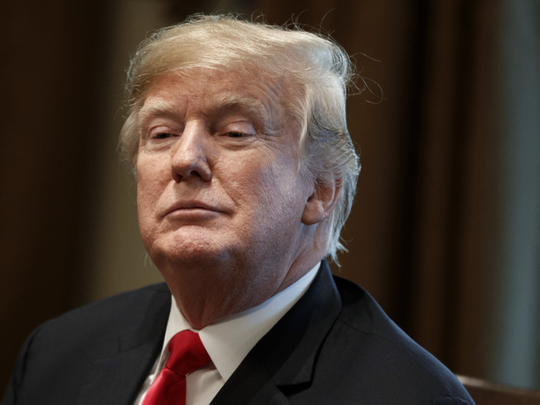
When Donald Trump was running for the president of the United States, he decried American troop involvement in foreign lands. At one of his rallies, he had stated that “I will never send our finest into battle unless necessary, and I mean absolutely necessary. The world must know that we do not go abroad in search of enemies”.
Earlier this year, at a fund-raiser in Florida, Trump scorned the previous Republican president, George W. Bush, for starting the war in Afghanistan — an invasion that the late King Abdullah of Saudi Arabia had referred to as “an illegal war”. In his attack on Bush, Trump said the decision to send US troops into Iraq was like “throwing a big fat brick into a hornet’s nest ... Here we are, like the dummies of the world, because we had bad politicians running our country for a long time”. He also referred to Bush sarcastically, calling him a “real genius” over his decision to invade Iraq.
Now, 15 years after the initial invasion in the region, Trump has suddenly made a decision that the troops in Syria and Afghanistan would be returning home. He is a businessman and he thinks in dollars and cents, profit and loss. Military excursions bring no rewards unless foreign powers pay handsomely for it. And in the case of Afghanistan and Syria, the money was simply not flowing in. “We’re no longer the suckers of the world,” he told US troops he visited during his recent trip to Iraq.
But this decision to pull out troops did not sit particularly well with Israel and its supporters in the US. Defence Secretary Jim Mattis resigned in protest over the withdrawal of US troops from Syria and Afghanistan, saying in his resignation letter that the president deserved someone in charge of the Pentagon who was “better aligned” with his views. Criticising his decision, the rising clamour of protests forced Trump to respond with assurances that the security of Israel would not be threatened.
Under attack
Talking to reporters following a trip to Iraq last week, the US president said “I spoke with Bibi”, referring to Israeli Prime Minister Benjamin Netanyahu. “I told Bibi, you know we give Israel $4.5 billion [Dh16.55 billion] a year. And they are doing very well at defending themselves. I’m the one that moved the embassy to [occupied] Jerusalem. I was the one who was willing to do that. So that’s the way it is — we are going to take great care of Israel. Israel is going to be good. We give Israel 4.5 billion a year. And we give frankly a lot more than that if you look at the books. They’ve been doing a good job.”
He made it plain for everyone to note that the mess in the Middle East created by an earlier administration was simply not America’s war. Despite the president’s assurance, he is under attack by the pro-Zionist movement in the US whose life-long aim was the existence and forward progress of Israel over everything else regardless of the cost to American lives and capital.
The incursion into Iraq and the massive amount of human toll that followed have indeed been a war crime of huge proportion. Iraq had nothing to do with the 9/11 terror attacks on America. Yet, Israel was threatened by Iraq’s growing strength and in wanting to be the only super military power regionally, got its Zionist sympathisers in the US Congress and Senate (as well as presidential advisers) to sanction that dreadful decision to invade Iraq.
Israel, under the pretext of being under constant threat, has successfully got the US involved in several conflicts in the region on its behalf. Through its backers in Washington DC, it has managed to dry up all humanitarian aid to hapless Palestinians, who are losing their lives, lands and identify.
Its war crimes are too many to list on a single page and yet the world turns a blind eye to the hour-by-hour murder, imprisonment and forced eviction of innocent Palestinians. Israel today is an apartheid state and no matter how much it tries, it cannot squelch the burning desire of Palestinians for freedom. And just as the pre-Nelson Mandela days of apartheid South Africa came to an end, so will Israel’s current doctrine.
Perhaps in some strange way, Trump’s decision to break away from too much involvement in the region may bring about a way to peace, as regional countries will begin to understand that wars without the backing of superpowers will eventually affect them and their people negatively.
Some decisions in the past by Trump would leave me confounded. However, I have to admit that in taking the decision to pull his troops out of the region, he is indeed thinking of America First.
Tariq A. Al Maeena is a Saudi socio-political commentator. He lives in Jeddah, Saudi Arabia. Twitter: @talmaeena.










